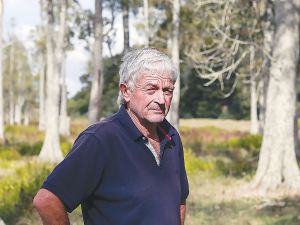Government plan to scrap regional councils faces criticism
Government plans to get rid of regional councillors shows a lack of understanding of the fundamental problem affecting all of local government - poor governance.
 Waikato Federated Farmers president Keith Holmes says farmers cannot invest in riparian planting while their businesses run in deficit.
Waikato Federated Farmers president Keith Holmes says farmers cannot invest in riparian planting while their businesses run in deficit.
Don’t expect farmers to spend money on riparian planting and fencing if their businesses are running in deficit, says Waikato Federated Farmers president Keith Holmes.
“You can’t be green if you’re in the red,” Holmes told Dairy News.
He was responding to a Waikato Regional Council catchment report, which revealed that it worked with 296 properties across the region last season to undertake voluntary environmental action. Landowners had collectively completed nearly 150 kilometres of fencing, planted nearly 450,000 plants and retired nearly 940 hectares of land.
Farmer participation was lower in comparison to the previous season, when with higher levels of funding, the council worked with 341 landowners to retire 1726 hectares of land, plant 950,000 native trees and protect 137 kilometres of waterways.
The council report stated that despite an excellent grass growing year, the most common reason given by landowners to delaying work relates to lower discretionary farm income, resulting from a combination of poor returns, high ‘farm gate’ inflation and increases in debt-servicing costs.
Hauraki Coromandel Catchments manager Emily O’Donnell is encouraging landowners and land managers to take advantage of current funding opportunities available.
“We have skilled catchment management officers covering all of our region who can provide advice and information specific to your property,” says O’Donnell.
“In many cases, the funding to support this work is only available within a certain time frame, so don’t miss out. Give one of our team a call today and see if your project qualifies for funding.”
Council funding ranges from 35% of costs to 80%, depending on the location, type of work and funding available, and landowners can use their labour and materials contributions as work in kind. The amount of funding available to landowners depends on whether landowners are in an identified priority catchment and whether the council has secured additional funding for work programmes outside business as usual.
But Holmes points out that with the milk money drying up, farmers could not be expected to spend on extra planting and fencing.
“Who will pay for it? Farmers don’t have the money, they are running deficits,” he says.
Holmes also wants a revaluation of the riparian planting programme.
He claims some plants offered by councils are unsuitable for riparian and catchment planting.
“They get peeled off from edges of drains and end up clogging culverts,” he says.
Some fenced-off areas grow weeds and attract feral animals - pigs, possums and goats - that damage paddocks.
Waikato West Coast Catchments manager Grant Blackie says, in 2023/24, to encourage landowner uptake, the council targeted mailouts to landowners within priority catchments (along with other measures to promote landowner uptake).
“The response from landowners was pretty good, with the best response coming from landowners in the West Coast zone, although most of the benefits from that will be seen in 2024/2025 and beyond. While this may mean some landowners are holding off making decisions, they could miss out on the current funding opportunities available to assist with catchment work.”
A seven-year summary of catchment restoration activities has shown the council has worked with landowners and iwi to complete almost 1600 kilometres of fencing, retiring 8442 hectares of riparian or erosion prone land and planting over 4.5 million plants.
Former Fonterra executive Alex Turnbull has been appointed CEO to lead all five Yili Oceania Business Division companies in New Zealand.
Fonterra executive René Dedoncker is leaving the co-operative later this year to lead Australian agribusiness Elders.
Alliance Group and the Southland Stags rugby team have joined forces in a partnership that will see the the meat co-operative's farmgate brand feature on players' team kits and replica jerseys.
Fonterra's plan to expand its organic programme to the South Island is being well received by farmers, the co-op says.
Voting has started for the renewal of DairyNZ's milksolids levy.
The most successful catchment groups in NZ are those that have 'a source to sea' approach.
OPINION: A dairy version of fantasy football has been launched.
OPINION: In recent weeks beaches in Auckland, Wellington and Christchurch have been unsafe to swim in because of recent heavy…